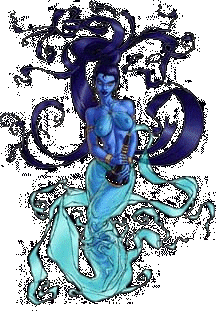
Botticelli painting Aphrodite and Ares
Gods and Monstrocities
This site is a summary of various Gods or godlike creatures, heros and beasts. It was impossible to list them in alphabetical order, due to conflicting theories of their origin. I tried my best to keep them in in some order. Mistakes are possible and likely.
Amazons |Aphrodite Urania| Centaurs | Fates & the Graie | Heracles-Hercules | Heroes & Heroines | Muses | Monstrocities | Nymphs | The Olympian Gods | lesser Gods in alphabetical order | Tamboura's Sanctuary | Links

click on this special link !
Adonis
Adonis was born after an incestuous union between King Cinyras of Cyprus and his daughter
Smyrna. Aphrodite saw Adonis at his birth and was so taken by his beauty that she hid him away in a coffer. She told this to Persephone who, in Aphrodite's absence, opened up the coffer. When she beheld Adonis she was struck by his beauty too. She kidnapped him and refused to give him up. Aphrodite appealed to Zeus, who decreed that Adonis must spend a
third of the year with her, a third with Persephone and the other third on his own. He usually spent his time boar hunting. Aphrodite tried vainly to dissuade Adonis from hunting this dangerous game. One day he was killed by a wild boar, after which Aphrodite begged for his life with Zeus. He agreed but decreed that Adonis should now spend half a year with Persephone and the other half with Aphrodite.
APHRODITE
Aphrodite image (above)
from
"Birth of Venus"
by Sandro BotticelliAphrodite, the goddess of love and beauty, was born from the foam of the sea. She was married to Hephaestus, the god of fire and smithy to the gods. Sacred to her are the myrtle, rose, apple, poppy, sparrow, dove, swan, swallow, tortoise, ram, the planet Venus, and the month of April. Eros was produced from a liason with Zeus. Her favorite lover is the god of war, Ares. She represented sex, affection, and the attraction that binds people together.
Aphrodite (Latin Venus): There are two versions of Aphrodite's family background. According to Hesiod's Theogony, lines 190-200 she was one of the most ancient deities, born from the foam surrounding Ouranos' castrated genitals when they fell into the sea. She came to land first on the island of Kythera and finally on Cyprus, hence her titles 'Kyprogenes', 'Kytherea' and 'Kypris'. Hesiod also derives her title 'Philommeides' from the Greek 'medea' meaning 'genitals', but this is probably fanciful word-play. The usual translation is laughter-loving'.
In Homer's Iliad 5 Aphrodite is depicted as the daughter of the minor goddess Dione and therefore as belonging to a younger generation of gods. The discrepancy between the two versions gave rise to one of the most important philosophical discussions of myth in classical literature: the speech of Pausanias in Plato's Symposium. Pausanias (not to be confused with the second century travel-writer of the same name!) identifies the older, motherless Aphrodite as 'Ourania' (literally 'heavenly') and the other as 'Pandemos' or 'vulgar', 'of the people'.
He then argues that there are two forms of Eros or love which correspond to the two Aphrodites.
Aphrodite herself was not immune to sexual passion. In the Odyssey the Bard Demodokos sings of her affair with Ares, in the Theogony the pair are said to be the parents of Deimos, Phobos and Harmonia. She is also mother of the Trojan hero, Aineas, by the mortal Anchises. This affair is the subject of the Homeric Hymn to Aphrodite.
Another mortal lover of Aphrodite was Adonis who was killed while hunting.

